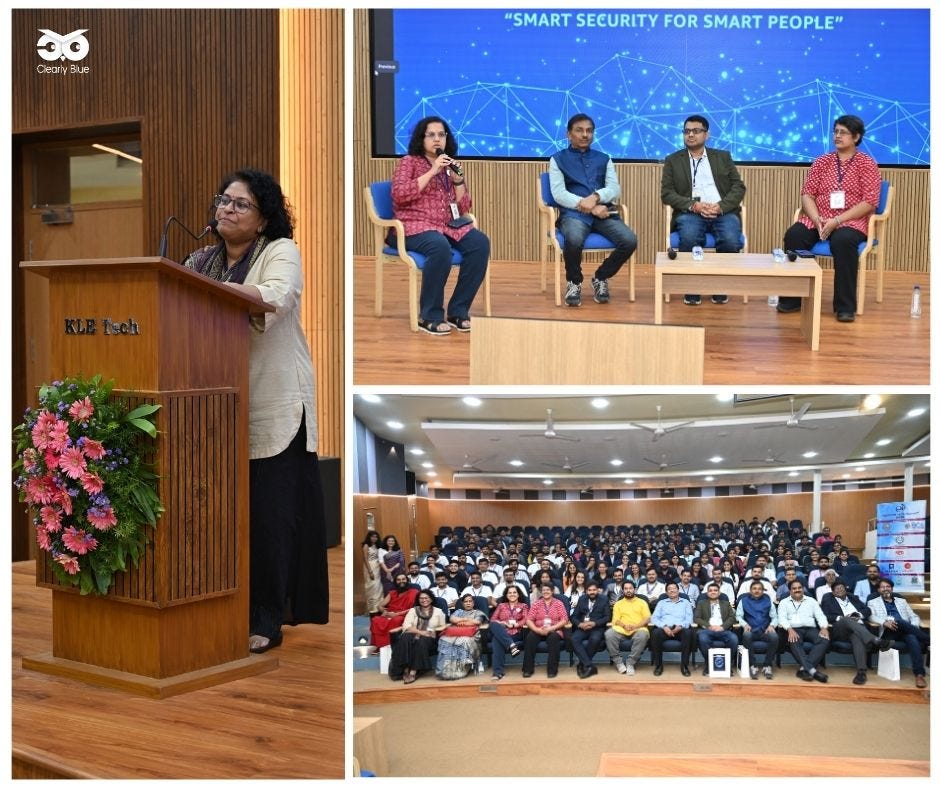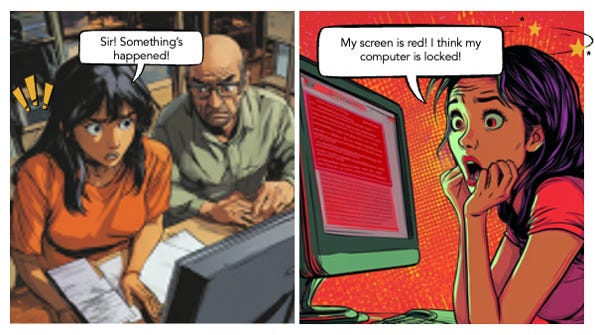अगम्य (agamya) means inaccessible or unattainable in Sanskrit. That's the goal of cybersecurity—securing our resources from falling into the hands of unwelcome threat actors.
Adeptic Creative Labs (the products wing of Clearly Blue) recently co-sponsored the Agamya Tech Summit 2024, a cybersecurity conference in Hubballi. Upon landing in the cosy 3-gate Hubli airport, we scanned the faces of our co-passengers wondering how many of them we'd meet again at the conference. At the conference, we found ourselves amid eager students, research-oriented professors, astute industry leaders and savvy enthusiasts. As it was the first cybersecurity conference in North Karnataka, students from nearby towns had flocked in droves too. While some were eager to employ their technical prowess to nullify and recover from cyber attacks, a few were clueless but curious, and others were engaged in building safer systems and a more secure society.
Would you choose to live or work in a neighbourhood where there was a 96% chance that you'd be the victim of a crime? Well… you don’t have any choice in the digital world!
In Jan 2023, only 4% of global organisations1 were confident that their employees and users were protected from cyber attacks. The threats are both internal and external. The world lost $8.44 trillion to cybercrimes2 in 2022—that's 3.5 times the GDP of India! And, it is expected to triple to $23.82 trillion by 2027.
Not just organisations, individuals aren't safe either. The number of people around me who were scammed online or barely escaped one is rising y-o-y. Cybercrime is no longer something that we read/hear in the news that happened to somebody. That somebody could very soon be or already is a dear one. A little cybersecurity awareness can go a long way in staying safe online.
A security guard I know was recently forced to shell out thousands of rupees, i.e. several months of her salary. They lured her with a cheap loan, made her download a fake app and conned her into believing she received some money in her account. Then, they resorted to typical loan shark techniques—a mix of intimidation, abuse and sweet-talk (the in-famous good cop–bad cop routine!), threats and blackmail. Despite my exhortations to ignore them and not pay, she felt coerced and paid them—not once, but multiple times.
Education and awareness alone won't suffice to prevent vulnerable people from falling prey to cyber attacks. Fighting cybercrime needs a systemic, multi-pronged approach with support from governments, laws, institutions and the public.
Did you know…
…94% of cyberattacks began with an innocuous-looking (phishing) email?3
Cyber incidents are bound to happen. But organisations can become more cyber-resilient by creating a Business Continuity and Disaster Recovery (BCDR) Plan.
We conducted a workshop at the conference employing a blend of comic-strips, storytelling and scenario-based learning to help attendees understand the importance of BCDR. Participants, students and experts alike, were asked to help a fictitious automotive parts company that became the victim of a ransomware attack. Collectively, they came up with things to include in a cybersecurity awareness training program for the employees of the company. They also brought up multiple issues to consider, handle and document in the BCDR plan for the company.
Why don’t you try it for your company? Here’s a handy template.
Skills to Build a Career in Cybersecurity
Cybersecurity is already a billion-dollar industry and cybercrimes are growing by 15% every year. Yet, there is an alarming shortage of skilled Cybersecurity experts in the industry. Most public organisations (52%)4 state that the lack of skills is their biggest challenge in becoming cyber-resilient.
Image courtesy: Wikipedia
You don’t need to be a maths genius or a tech wizard to enter the field of cybersecurity. Threat actors don’t restrict themselves to these domains. Then, how can we? There are multiple roles in the field and within all industrial sectors, not only in tech companies. Critical thinking, problem solving, communication and people skills are core skills to excel in a career in this domain. Beyond that you need a good understanding of the business and its operations to know what to secure and how.
At Adeptic, we have built short, practical courses for students and professionals to acquire in-demand cybersecurity skills, in partnership with Cyberverse Foundation. If you are an educator or L&D leader interested in offering this to your learners, write to us at learn@adepticlabs.com.
K9 Security
After the conference, while we waited at the gate for our return flight, I saw some movement out of the corner of my eye—a bushy, wagging tail. The next instant, a dark brown, almost black, Belgian Malinois was leaning on me, tongue lolling to a side, imploring me for some quick scratches with his soft, honey-brown eyes. For the next few seconds, this young lad forgot he was working and became just a happy dog looking for some human love and affection. His K9 handler was not pleased, but it took him a while to get our boy to leave. The sniffer dog then led his K9 handler around the airport, stopping to sniff at all nooks and corners. Occasionally, the handler stopped and asked the dog to sniff something and he jumped to do his bidding.
This Independence Day, President Draupadi Murmu honoured an army dog named Kent with the Presidential Gallantry award. This canine soldier sacrificed herself to save her handler during an operation in Jammu & Kashmir. Let’s take a moment to celebrate and appreciate the service of working dogs in keeping our society and our borders safe.
"In a mostly online world, privacy is not the same as anonymity. Privacy is boundary management. Privacy means being able to assert control over who has access to what data about us. It means being able to express who doesn't have access or what they can't use it for. And, knowing that our wishes will be respected."
Cheers,
- Madhavi Nadig
Cyber Keeper & Story Weaver




